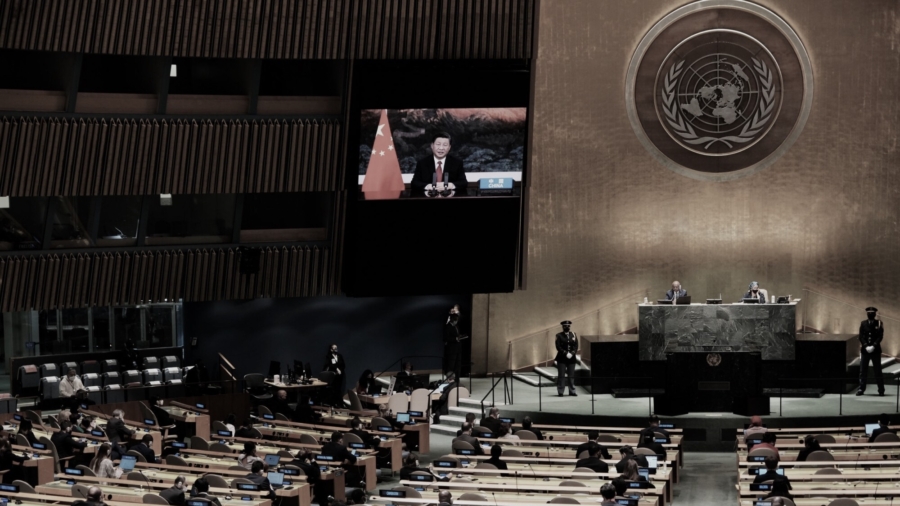Xi Jinping took several jabs at Washington on Sept. 21, in a prerecorded speech to the United Nations’ 76th General Assembly.
Separately, President Joe Biden has been criticized by Republican lawmakers for failing to use his speech at the U.N. headquarters in New York to hold China accountable on a number of issues.
“Recent developments in the global situation show once again that military intervention from the outside and so-called democratic transformation entail nothing but harm,” Xi said, without naming any country. However, the remark is an apparent reference to the tumultuous U.S. withdrawal from Afghanistan last month.
For over a month now, the Chinese regime has been using the chaotic U.S. pullout to carry out a propaganda campaign, painting the United States as an unreliable ally and questioning U.S. democracy. Most recently, on Sept. 18, China’s state-run media Global Times stated in an editorial that “the U.S. and the West ran away leaving a mess in Afghanistan.”
In another veiled criticism without naming any country, Xi stated the world needed to “reject the practice of forming small circles or zero-sum games.”
Just days earlier, China’s foreign ministry spokesperson Zhao Lijian used the same language during a daily press briefing. He accused Australia, the United States, and the United Kingdom of having an “outdated Cold War zero-sum mentality” with their new security alliance.
Under the security pact, the United States and the UK will share submarine technology with Australia, allowing the latter to field a fleet of at least eight nuclear-powered submarines by 2040.
Xi repeatedly called for cooperation and multilateralism in his speech, including a better “coordinated global COVID-19 response” among countries.
However, the international community has questioned China’s willingness to cooperate with the global fight against COVID-19, a disease caused by the Chinese Communist Party (CCP) virus, since the regime decided to silence whistleblower doctors at the onset of the outbreak.
Beijing was criticized for failing to cooperate with a World Health Organization-led investigation team conducting groundwork in the Chinese city of Wuhan earlier this year. A U.S. intelligence report released last month stated that it couldn’t come to a conclusive assessment about the origins of the virus, given China’s refusal to cooperate.
Xi also proclaimed that “China has never and will never invade or bully others or seek hegemony.” The statement, however, would likely not sit well with China’s critics, considering the regime’s aggressive behaviors in the South China Sea and coercion tactics against Taiwan.
The Chinese leader made an environmental pledge during his speech, stating that Beijing “will not build new coal-fired power projects abroad.” However, he did not make any comment on domestic coal plants, considering that China is the world’s largest producer and consumer of coal.
Theresa Fallon, director of the Center for Russia Europe Asia Studies in Brussels, took to Twitter to say that Xi shouldn’t be given applause over the pledge, considering “how many [coal plants] they [China] have built before,” by pointing to data from the Global Coal Public Finance Tracker.
Xi’s speech is good as a reference, but the focus should be their actions rather than words, said Su Tzu-yun, an analyst at the Institute for National Defense Security Research in Taiwan.
“The Chinese Communist Party’s negotiation history has not been too glorious,” she told The Epoch Times, noting the Party had broken its promises of political freedom to Tibet and Hong Kong. “They negotiate when the situation is favorable, but resort to military aggression and bullying when it’s not,” he said.

Biden
Biden, in his first address at the U.N General Assembly since taking office, declared that the United States is “back at the table in international forums.” He also called for nations to “work together like never before” on global issues, including climate change and the spread of the CCP virus.
“We are not seeking a new Cold War or a world divided into rigid blocs,” Biden said, without naming any country.
He added, “The United States is ready to work with any nation that steps up and pursues peaceful resolution to shared challenges.”
Biden’s comment came after Antonio Guterres, the U.N. Secretary-General, raised concerns about a potential new cold war between China and the United States, in an interview with The Associated Press on Sept. 18.
Some observed that Biden didn’t say “China” in his speech. When asked why during a daily press briefing on Sept. 21, White House press secretary Jen Psaki said not mentioning China directly was “indicative of his [Biden’s] objective of laying out our proactive agenda of the big issues that we can work together on, including with China.”
Some Republican lawmakers pointed out Biden’s soft approach toward China.
“He should clearly state the threat China poses to the world—not pretend it doesn’t exist,” wrote Sen. Tom Cotton (R-Ark.) on Twitter about Biden’s omission of the word “China” in his speech.
Sen. Bill Hagerty (R-Tenn.) criticized Biden for resorting to “press release foreign policy” in his speech, according to a statement.
“Where was President Biden’s call to hold Communist China accountable for malign behavior[s], including the Chinese military’s growing threat against Taiwan and others, Beijing’s massive intellectual property theft, and China’s lack of transparency on COVID-19’s origins?” Hagerty added.
Sen. Rick Scott (R-Fla.) called on Biden to “end his weak appeasement” of Xi, according to a statement released from his office after the president’s speech.
“As the world’s greatest beacon of freedom and democracy, the U.S. must do everything we can, in conjunction with our allies, to curb Communist China’s reach, counter their policies, and make the guilty pay for the ongoing human rights abuses, attacks on democracy and genocide against the Uyghurs,” Scott stated.
He added, “President Biden’s refusal to take this approach is nothing short of a dereliction of his duty and inexcusable display of weakness.”
Beijing has locked up over 1 million Uyghurs and other Muslim minorities in internment camps in China’s far-western Xinjiang region.
Eva Fu and Luo Ya contributed to this report.
From The Epoch Times


